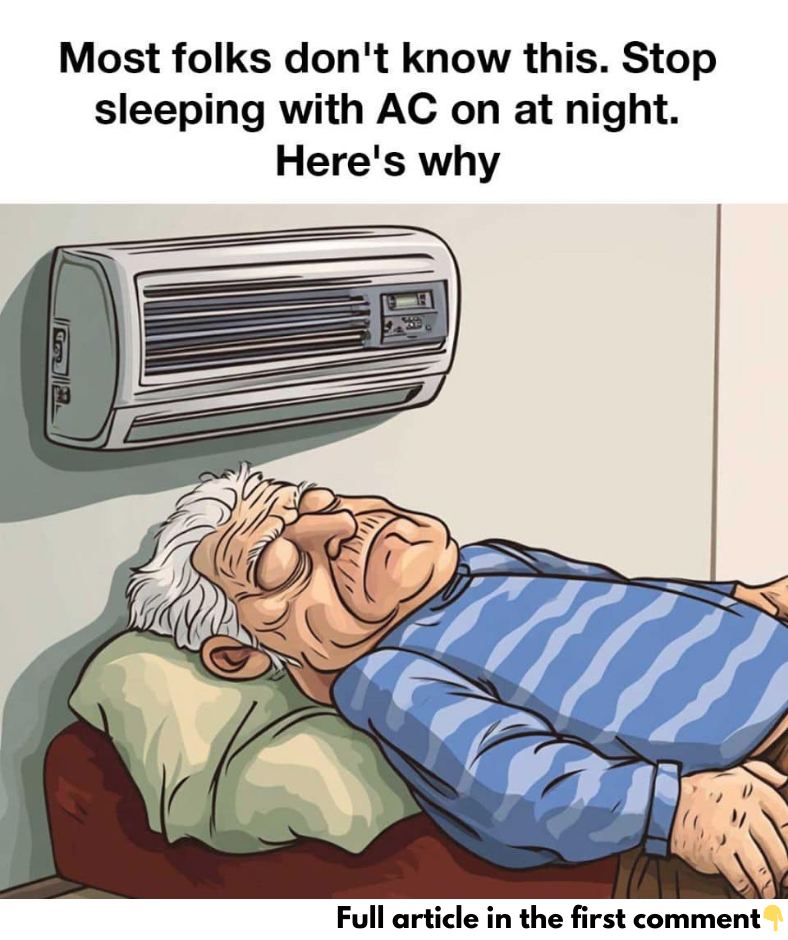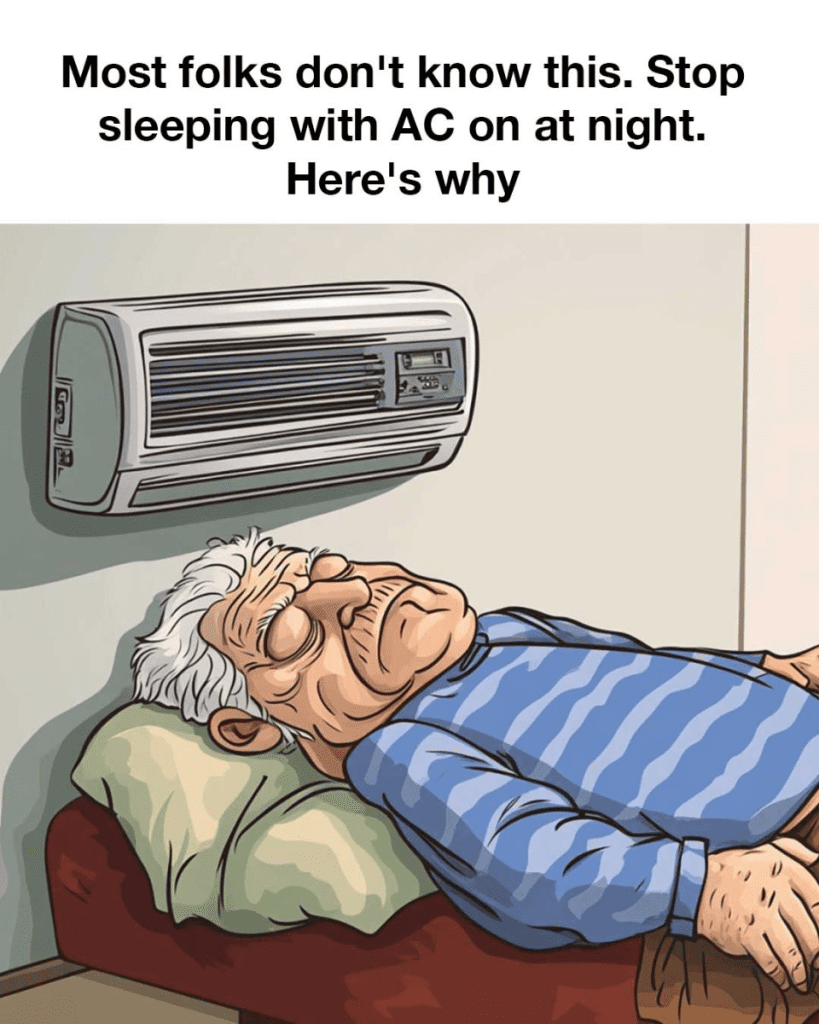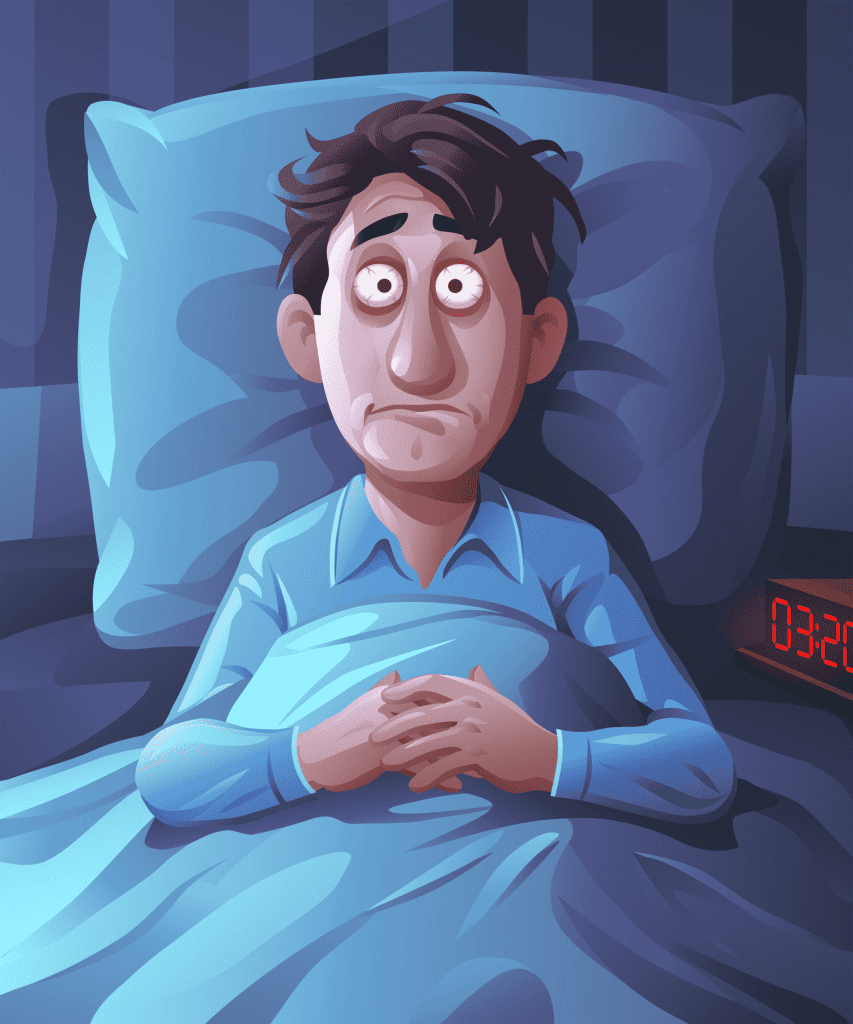
In many homes, especially during the sweltering summer months, air conditioning (AC) has become a staple for a comfortable night’s sleep. However, while the cool breeze from the AC might provide immediate relief, it’s important to consider the potential long-term consequences of sleeping with the AC on. This article explores why it might be time to rethink your nighttime cooling habits.
1. Negative Impact on Health

Sleeping with the AC on can lead to several health issues, some of which you might not even realize are connected to your cooling habits. Let’s dive into the specifics:
a. Dry Skin and Dehydration
Air conditioning reduces the humidity level in a room, which can dry out your skin and mucous membranes. If you’ve ever woken up with a dry throat, itchy eyes, or parched skin, your AC might be to blame. Over time, this persistent dryness can lead to more severe issues like dehydration or respiratory problems
b. Respiratory Problems
The cold, dry air produced by AC units can cause nasal passages to become congested, making it difficult to breathe. This is particularly concerning for individuals with pre-existing conditions like asthma, where the AC can exacerbate symptoms, leading to nighttime coughing or wheezing.
c. Increased Risk of Infections
Air conditioning units, especially those not regularly cleaned or maintained, can become breeding grounds for mold, mildew, and other pathogens. These can circulate in the air, increasing your susceptibility to respiratory infections, particularly during sleep when your immune system is at its most vulnerable.
d. Muscle Stiffness and Aches
Waking up with a stiff neck or back? The chilly environment created by the AC can cause muscle stiffness or worsen existing conditions like arthritis. Cold air causes muscles to contract, leading to aches and discomfort, especially if you sleep in an awkward position.
2. Disrupted Sleep Patterns
Our bodies are naturally designed to experience slight temperature fluctuations throughout the night as part of our circadian rhythm. When the AC keeps the room at a constant, often lower temperature, it can disrupt this natural process.
a. Reduced Deep Sleep
A cooler room can prevent the body from entering the deeper stages of sleep, which are crucial for repair and recovery. Deep sleep is essential for muscle repair, memory consolidation, and overall physical recovery. An AC set too cold can interrupt this phase, leading to grogginess and a lack of restorative sleep.
b. Frequent Waking

If the AC temperature is set too low, you might find yourself waking up feeling cold or uncomfortable. This frequent waking can fragment your sleep, resulting in poor sleep quality and making it harder to feel rested in the morning.
3. Environmental Impact
Sleeping with the AC on all night doesn’t just affect your health—it also has a significant environmental impact.
a. High Energy Consumption
Air conditioning units are notorious for consuming a lot of power, especially when run continuously through the night. This increased demand for electricity can strain power grids, particularly during peak usage times in the summer.
b. Greenhouse Gas Emissions

The more electricity we use, the more fossil fuels are burned to generate it, releasing greenhouse gases into the atmosphere. Moreover, air conditioners use refrigerants, which can be potent greenhouse gases if not properly managed. Therefore, excessive use of AC contributes to global warming and climate change.
4. Financial Costs
Using the AC every night can significantly increase your electricity bills. The costs of running an AC unit can quickly add up, especially during the hotter months when it’s tempting to keep it on all night. By reducing your reliance on AC at night, you can save a substantial amount of money annually.
5. Alternatives to AC for a Good Night’s Sleep
Rather than relying solely on the AC to keep cool at night, consider these alternative methods that can help you sleep comfortably:
a. Use Fans
Ceiling or oscillating fans use far less energy than an air conditioner and can create a cooling breeze that helps with airflow without significantly lowering the room temperature.
b. Cool Bedding
Invest in breathable, moisture-wicking sheets and pillowcases made from natural fibers like cotton or linen. These materials stay cooler and can help regulate your body temperature.
c. Proper Ventilation
Open windows during the cooler parts of the day or night to allow fresh air to circulate. This can help reduce the need for artificial cooling.
d. Stay Hydrated
Drink plenty of water throughout the day to stay hydrated. Proper hydration can help your body regulate its temperature more efficiently.
e. Take a Cool Shower Before Bed
A quick, cool shower before bedtime can help lower your body temperature and make you feel more comfortable as you fall asleep.
f. Adjust Your AC Usage
If you must use the AC, consider setting it to a higher temperature, such as 78°F (25.5°C), and using a timer to turn it off after a few hours. This approach reduces the environmental impact and saves energy while keeping you comfortable.
6. Balancing Comfort and Health: Smart AC Use

If you’re not ready to give up the comfort of AC entirely, here are some tips for smarter AC usage:
a. Use a Programmable Thermostat
A programmable thermostat allows you to set the AC to a higher temperature during the night and gradually cool the room as it gets closer to your wake-up time. This ensures you’re not wasting energy cooling the room when you’re not awake to enjoy it.
b. Regular Maintenance
Ensure that your AC unit is regularly cleaned and maintained to prevent the buildup of mold, bacteria, and other pathogens. This not only helps your unit run more efficiently but also ensures that the air you’re breathing is clean and safe.
c. Combine AC with Other Cooling Methods
Use a combination of fans, proper ventilation, and cooling bedding along with the AC. This way, you can run the AC at a higher temperature or for a shorter period, reducing both energy consumption and health risks.
Conclusion
While sleeping with the AC on might offer immediate comfort, the potential health risks, environmental impact, and financial costs make it worth reconsidering. By exploring alternative cooling methods and using your AC more wisely, you can ensure a better night’s sleep while protecting your health and the environment. Remember, a good night’s rest shouldn’t come at the expense of your well-being or the planet.